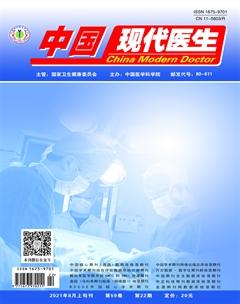抗高血压药物基因多态性研究进展
马丽秋 王闰 于涛 刘光耀 龚海东 王丽颖
[关键词] 高血压;抗高血压药物;药物基因组学;基因多态性
[中图分类号] R544.1 [文献标识码] A [文章编号] 1673-9701(2021)22-0188-05
Research progress on gene polymorphism of antihypertensive drugs
MA Liqiu1 WANG Run1 YU Tao1 LIU Guangyao1 GONG Haidong1 WANG Liying2
1.Department of Neurosurgery,Hongqi Hospital Affiliated to Mudanjiang Medical College, Mudanjiang 157000,China;
2.Department of Neurology,Hongqi Hospital Affiliated to Mudanjiang Medical College, Mudanjiang 157000,China
[Abstract] Hypertension is one of the most relevant risk factors for cardiovascular disease,and its prevalence continues to rise worldwide,but it cannot be cured according to current medical treatments.The main treatment for hypertension is the use of antihypertensive drugs to control blood pressure,improve symptoms and reduce complications.At present,great progress has been made in the research on gene polymorphisms of antihypertensive drugs.It has been found that some gene polymorphisms have an impact on the metabolism and efficacy of antihypertensive drugs,such as angiotensin II receptor,cytochrome P450,etc.Genetic testing technology has been used by clinicians to guide patients in medication,which has greatly improved the therapeutic effect of hypertension.In-depth study of gene polymorphisms of antihypertensive drugs and discovery of new targets that affect the effects of antihypertensive drugs are of great significance for improving existing antihypertensive drugs and developing new and more effective antihypertensive drugs.This article reviews the related gene polymorphisms of five types of antihypertensive drugs commonly used in hypertension,and provides new insights for precise treatment and individualized treatment of hypertension patients.
[Key words] Hypertension;Antihypertensive drugs;Pharmacogenomics;Gene polymorphism
高血压是多种循环系统疾病最主要的危险因素,易并发脑卒中和心力衰竭等多种高风险疾病。根据2015年的调查结果显示,全球高血压患者约11.3亿人,其中因收缩压>140 mmHg而导致患者死亡的死亡率约为106.3/10万,我国高血压患病率约为23%、控制率约为15%、知晓率约为47%[1-2],控制率明显低于美国等发达国家。
高血压主要依靠药物治疗,但药物效果差异较大,這与患者的身体健康状态、遗传因素、病因、年龄等多种因素相关。研究表明,药物代谢酶、转运蛋白和相关药物作用受体变异是药效差异的主要原因[3],部分患者药物疗效差,甚至出现严重的不良反应。
1 高血压相关基因研究概述
高血压的致病因素主要包括遗传和环境,而遗传因素的影响较大,针对高血压患者遗传因素的研究表明,遗传因素导致的血压差异约占30%~50%,遗传因素不仅与高血压有关,也与降压治疗的效果有关[4]。单基因遗传性高血压包含Gordon综合征、先天性肾上腺皮质增生症、Liddle综合征等。原发性高血压为多种基因共同致病,对于高血压致病基因、血压变化相关基因和影响药物治疗效果基因进行研究已成为热点。研究发现,白介素10和内皮型一氧化氮合酶(Endothelial nitric oxide synthase,eNOS)均可以明显的降低血压[5-6]。Li等[7]根据加权基因共表达网络分析发现miR-548am-3p、miR-513c-3p、miR-182-5p、miR-548d-5p、IGF1R、GSK3B、FOXO1、PRKAR2B、HIF1A、PIK3R1均与高血压相关。目前,已经发现约120个基因与高血压的致病性和药物敏感性等特性相关,其中约有26个基因可以进行深入研究,具有一定的靶向治疗潜力[8]。

